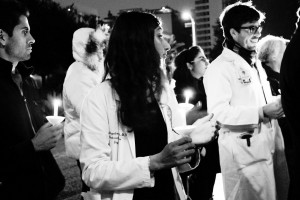Candlelight vigil calls for gun control in N.O.
2nd January 2013 · 0 Comments
By April Siese
Contributing Writer
A candlelight vigil took place on the steps of City Hall Thursday evening to honor the victims of the Newtown tragedy and to raise awareness of gun-control issues in our own city, as well as the importance of mental health care. Louisiana is 50th in per-capita funding of community-based treatment services with only 30 percent of mental health dollars allocated for community-based care, according to the Public Affairs Research Council of Louisiana.
Dr. Pritesh Gandhi, a pediatrics and internal medicine resident at Tulane, helped coordinate the vigil as part of his efforts with Doctors For Gun Control. Started just a few weeks ago, DFGC is an organization dedicated to treating violence as a public health issue. It is Gandhi’s hope that the tragedy in Newtown can be used as a call to action for those in the healthcare field to go beyond the confines of a hospital or a clinic and focus more on mental health care within the community at large.
“Mental health care is sort of what underpins the health system in a city that suffers from urban poverty like we do. Without strong mental health care, it’s not possible to break the cycles of pathology and poverty. It’s just a huge anchor in what we do,” Gandhi told The Louisiana Weekly in an interview before the vigil.Despite chilly temperatures, the vigil saw a turnout of around 25 people from the healthcare field and church as well as concerned members of the community. Jenny Thomas, a Presbyterian minister in attendance, was hopeful about DFGC’s work and outreach in the community. “I’m glad to see that there’s an organization targeting health care to reduce gun violence and increase mental health care because I think the two go hand in hand,” Thomas said.
Gandhi was joined by Father Bill Terry of St. Anna’s Episcopal Church and Councilmember LaToya Cantrell. Both have been heavily involved in the anti-violence movement, with Terry gaining recognition for his murder wall in which the names of every victim of fatal violent crimes were posted outside the church. Terry led those in attendance in a reading of the 16 names of violent crime victims during the month of December in New Orleans. During the ceremony, Terry stressed the importance of unity and DFGC’s steps in community outreach.
“I challenge other professions to make this step forward: stop. Because if anything is sacred, it’s our humanity and if we believe indeed that [that] is sacred, we will stop and we will begin to rebuild a healthier system – a mental health care system,” Terry continued, “If anything is said tonight, let it be said that Dr. Gandhi and the physicians and allied healthcare professionals and at least this dozen or two dozen people to step forward tonight will continue the work of stopping the violence here and throughout this country.”
Councilmember Cantrell echoed Terry’s statements, stating that “this has been a big opportunity to end the silence of gun violence and call on local, federal, and state officials to really take a stand against guns throughout our country.”
The NOPD sees the vigil as a way to help New Orleans heal in the wake of such tragedy while also promoting community activism, as is usually the case in crimes committed against children. “The people of New Orleans tend to come together more readily when an innocent child has been harmed. There is tangible outrage, and the NOPD receives the most tips and information from the community about possible perpetrators when a child is violently taken from our New Orleans family,” NOPD spokeswoman Remi Braden said in a statement.
A statement from the mayor’s office echoed solidarity with DFGC’s message, stating that “our administration views violence as a public health issue. That’s why we’ve taken that approach to murder reduction with our NOLA FOR LIFE plan.”
This article was originally published in the December 31, 2012 print edition of The Louisiana Weekly newspaper




